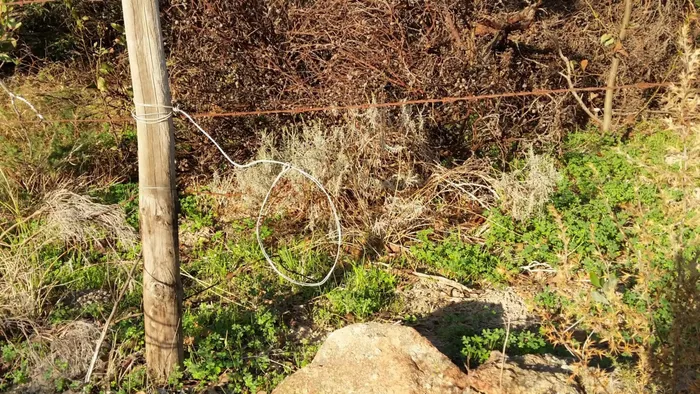Move to protect wildlife from snares

A wire snare along a fence near an animal trail. Picture: supplied
Conservation and animal-welfare groups have launched a project to counter wildlife snares in the province.
The illegal hunting practice is a serious and widespread problem in the province, according to the five organisations behind the project.
A snare is an anchored noose fashioned from wire, cable, rope, or nylon and set to catch animals either by the foot, head or body. Snares are often set to catch small antelope, porcupine and other game-meat species, but they also maim and kill predators such as caracals and leopards and threaten ecosystems.
Preliminary research suggests that bush meat is the main motivation for setting snares in the Western Cape, says Cape Leopard Trust spokesperson Jeannie Hayward.
“The method is exceedingly wasteful as set snares are often not checked, resulting in captured animals dying and simply rotting away. Caught animals are sometimes able to break the snare off from its anchor, following prolonged struggle to escape, leaving the animal severely hurt or maimed.
“Snaring can also have negative consequences for people, as consuming bush meat may cause serious illness, and pets and livestock may be trapped in snares."
Together with CapeNature, Kogelberg Biosphere, Wildlife Forensic Academy and the Cape of Good Hope SPCA, the trust has developed the Western Cape Snare Response Plan to deal with snaring incidents.
Representatives from the provincial government, district municipalities, environmental groups and nature reserves were among those who attended the launch of the plan, as part of a Snare Free campaign, at Kirstenbosch Botanical Garden on Tuesday August 1.
“The launch is the culmination of twelve months of work by the task team to design and develop Snare Free as an integrated project with its own logo, a dedicated website, an email address, and a hotline phone number," said Cape Leopard Trust research and conservation director Katy Williams.
“It is our hope that the Snare Free project model will be shared widely, as we envision that this type of initiative will be replicable elsewhere.”
Apart from the response plan, with its hotline and support vehicle, Snare Free will also promote awareness and education and improve training and data collection.
A research project will also work with communities to better understand the reasons for snaring and find solutions for it.
Cape Leopard Trust CEO Helen Turnbull said Snare Free was the first step in a coordinated effort to investigate and respond to the “increasing snaring threat” and a lot of work lay ahead as the plan evolved.
"Given the number of snares uncovered in targeted areas, we are certain this is just the tip of the iceberg. This will be a time of learning for the partners, but it is also an exciting opportunity for us to step up as a collective and take positive action.”
The Snare Free project is supported by the International Fund for Animal Welfare and the Rolf-Stephan Nussbaum Foundation.
If you discover a live wild animal caught in a snare in the Western Cape, call the Snare Free hotline at 076 127 8485. Keep your distance from the animal, keep noise to a minimum, advise other people to refrain from entering the area, and provide the hotline operator with the location (preferably the GPS coordinates) of the snare; a description of the animal, including its species, if known; and your contact number.
If you discover empty snares or a dead animal caught in a snare, take a photo and report it to the Cape Leopard Trust’s online data portal (app.capeleopard.org.za). You will need to provide the location and a photograph. Then remove and dispose of the snare/s responsibly to ensure that they cannot be used again. Visit snarefree.co.za for more information.